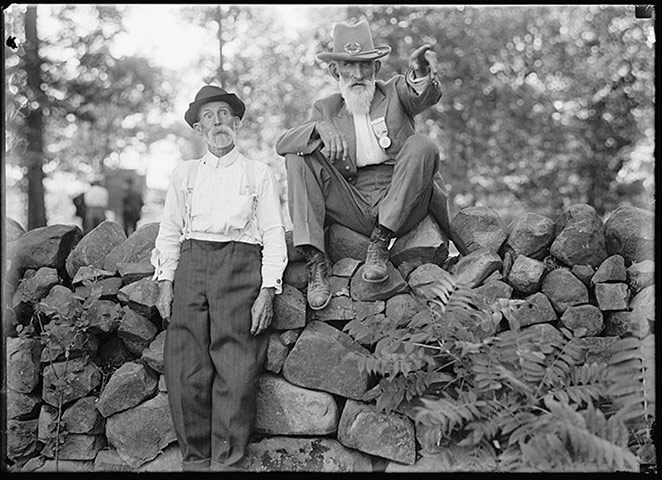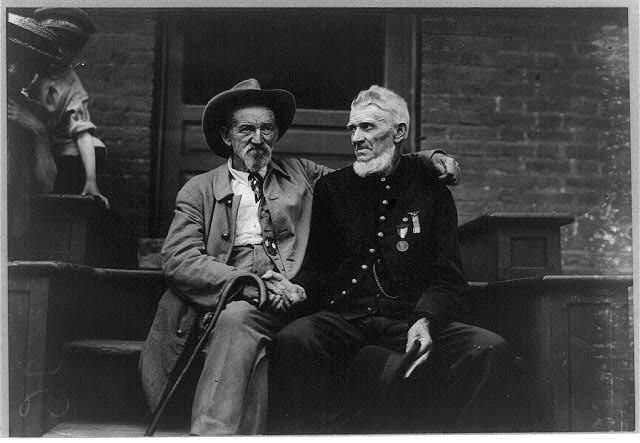How could a people accomplish that? It seems beyond human capability.
I've felt in the last few days like Yosemite Sam in one of the Bugs Bunny cartoons, Bugs gets the drop on Sam again and Sam says, "I don't know how's ye did it but I knows ye did it!" I know the Civil War generation did it--fought a war, killed each other dead, held an election in the middle of the war, assassinated the election's victor, ended the war, ended slavery, ended secession, restored the Union, bound up the nation's wounds, made the United States a singular noun--but I don't know how they did it. It does not seem humanly possible.
Lincoln gave an ethereal view of the war in his second inaugural: he blamed both sides, the South for perpetrating slavery, the North for permitting it. He came to see slavery almost as a birth curse--It was in the Constitution!--that was almost beyond his, or any mortal man's, power to get rid of without killing that which was born with it. "Fervently do we pray that the scourge of war shall pass away," yet, if God willed that every drop of blood drawn by the bondsman's lash shall be repaid drop-for-
drop, "the judgments of the Lord are true and righteous." Lincoln was a lawyer, there had to be justice
paid for slavery!, and the Lord had a terrible swift sword to administer justice. To both sides.
There was, or there came to be, in Abraham Lincoln's mind, in the minds of enough Northerners, an other-worldly purpose to the Civil War beyond the original purpose, restoration of the Union; there came to be, in Frederick Douglass' phrase "something beyond the battlefield," the war became God's will, however it was to turn out and at whatever cost, it would be God's will, and we, they, were merely the instruments working God's will and ignorant of His purpose.
Heh-heh-heh-heh. North and South contemplating Pickett's Charge at the stone wall. "How DID we do that?" "I'on't know."
"We was right over yonder, see?" "Ohhh." Heh-heh-heh-heh. A Johnny Reb explaining Pickett's Charge to a Billy Yank.
I've felt in the last few days like Yosemite Sam in one of the Bugs Bunny cartoons, Bugs gets the drop on Sam again and Sam says, "I don't know how's ye did it but I knows ye did it!" I know the Civil War generation did it--fought a war, killed each other dead, held an election in the middle of the war, assassinated the election's victor, ended the war, ended slavery, ended secession, restored the Union, bound up the nation's wounds, made the United States a singular noun--but I don't know how they did it. It does not seem humanly possible.
Lincoln gave an ethereal view of the war in his second inaugural: he blamed both sides, the South for perpetrating slavery, the North for permitting it. He came to see slavery almost as a birth curse--It was in the Constitution!--that was almost beyond his, or any mortal man's, power to get rid of without killing that which was born with it. "Fervently do we pray that the scourge of war shall pass away," yet, if God willed that every drop of blood drawn by the bondsman's lash shall be repaid drop-for-
drop, "the judgments of the Lord are true and righteous." Lincoln was a lawyer, there had to be justice
paid for slavery!, and the Lord had a terrible swift sword to administer justice. To both sides.
There was, or there came to be, in Abraham Lincoln's mind, in the minds of enough Northerners, an other-worldly purpose to the Civil War beyond the original purpose, restoration of the Union; there came to be, in Frederick Douglass' phrase "something beyond the battlefield," the war became God's will, however it was to turn out and at whatever cost, it would be God's will, and we, they, were merely the instruments working God's will and ignorant of His purpose.
Maybe that is explanation for the sound of Lincoln's second inaugural: ethereal, above it all, detached, God-like; for the peculiar, detached, duty-bound actions of Andrew Atkinson Humphreys, of Henry Abbott, of so many others in battle; for their inspiration also. For if you see yourself as barely comprehending theater set piece acting a part, directed by an omniscient one, then you do your duty and beyond your capabilities, you do it with the serenity that detachment provides. It's your duty, it's your role, it's your job, you just work here on earth, it's just business, it's nothing personal, I just have to kill you, it's my job, yours is to die, we will always be friends. Perhaps that too is explanation for the magnanimity in Lincoln's second inaugural and for the post-war reunions. Did it not seem real, though?














